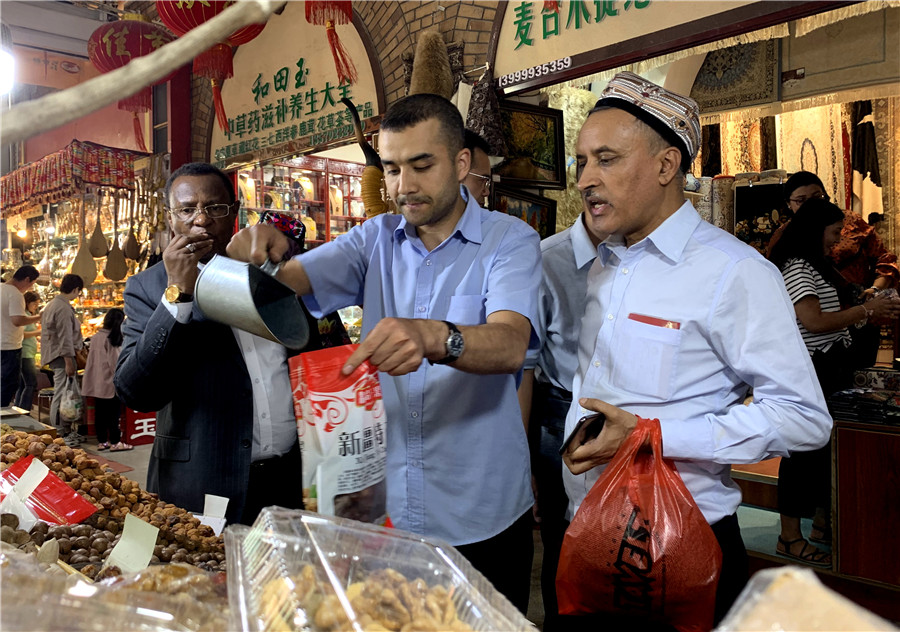Foreign diplomats praise government's efforts in western region
Ambassadors and envoys from seven countries visited the Xinjiang Uygur autonomous region from Aug 19 to 21 at the invitation of the regional government.
During the diplomats' visit to the Turpan City Vocational Education and Training Center, they attended classes, watched students engage in sports, and asked a large number of teachers and students about the curriculum, accommodations and food, as well as the healthcare situation.

Diplomats buy dried fruit at the Xinjiang International Grand Bazaar in Urumqi, the regional capital, on Aug 19. [Photo/Xinhua]
Through the visit and interaction, the diplomats said they had seen the real situation in Xinjiang, which is completely different from what they had read in reports by some Western media. The students are happy, relaxed and upbeat about their future, they said.
"The vocational education and training centers in Xinjiang are not 'concentration camps' as described by some Western media, but schools to help those influenced by extreme thoughts to eliminate the harmful thoughts and learn vocational skills," said Leela Mani Paudyal, Nepal's ambassador to China, during the visit.
"Every student I saw here was happy. They learn not only laws and regulations and standard Chinese, but also professional skills, which I believe will give them an edge to adapt to society after graduation and become strong competitors in the job market," the ambassador said.
Karunasena Kodituwakku, Sri Lanka's ambassador to China, said the education and training centers provide a "platform to eradicate extremism", which is beneficial to the trainees and the stability and development of society as a whole.
"This anti-terrorism example is worthy of study by many countries," he said.

Bounma Thipphonleuang, second secretary at the Lao embassy in China, dons a traditional Uygur hat at the Grand Bazaar in Urumqi on Aug 19. [Photo/Xinhua]
Religious focus
During the tour, the delegation also visited several religious institutions, including the Xinjiang Islamic Institute in Urumqi and the Kazihan Mosque in Turpan, and inquired about the cultivation of religious personnel and the construction and maintenance of religious places.
Ny Keoponha, first secretary of the Cambodian embassy in China, said he had found that people from all ethnic groups in Xinjiang have their freedom of religious belief fully respected, and their legitimate religious needs have been continually met. He praised the central government for providing support and convenience for normal religious activities and guaranteeing freedom of religious belief.
The delegation also visited the grand bazaar and local communities, watched music and dance performances and inquired about the progress of China's efforts in poverty reduction and the provision of grassroots services.
In the first half of this year, Xinjiang's tourism industry showed impressive growth, having received 75.9 million visitors, a rise of 46 percent from the same period the previous year. A large part of the tourism boom has been attributed to the sustained and stable development of Xinjiang.
Anwar Alabdulla, the Bahraini ambassador to China, said that about a month ago, Bahrain and many members of the Organization of Islamic Cooperation submitted a letter to the United Nations Human Rights Council to support the Chinese government's efforts to combat terrorism and extremism.
He added that after the tour he would try his best to provide a truthful picture of Xinjiang as a place of beauty, unity and harmony to the world.

